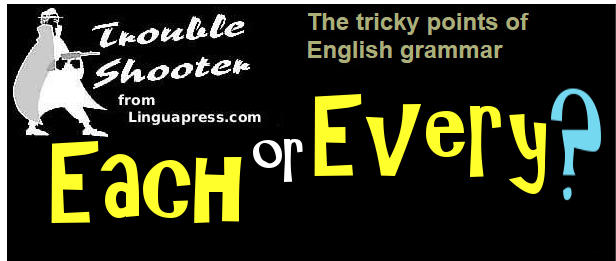
The words each and every in English grammar
When to use each and when to use every in English
Meanings and use of each and every
- Each refers to a plural number of people or items, but it considers each person or item as an individual or dissimilar unit, it does not consider the group collectively. Each can also be used as a pronoun.
- Every also refers to a multiple number of people or items; but it considers these people or items as part of a similar collective group. If there are just two items or people, every may be replaced by both. Every cannot be used as a pronoun.
Recommended
by teachers worldwide
FREE E-grammar
for KIndle Unlimited subscribers. Otherwise e-book from Amazon from just €3.99, £3.99 or $4.99

Also available for American English as
A New English Grammar
Sometimes it is important to distinguish between each and every
; in other cases, this distinction is not important, and the
user can choose either word.FREE E-grammar
for KIndle Unlimited subscribers. Otherwise e-book from Amazon from just €3.99, £3.99 or $4.99

Also available for American English as
A New English Grammar
Here are some pairs of sentences that clearly illustrate the difference between each and every. In the first sentence of each pair, the speaker is implying dissimilar or individual actions: in the second of each pair, the speaker is expressing similarity of action.
Examples :
Each
child was reading a different book (dissimilar
action)
Every child was reading a book. (similar action)
You have to fill in details on each page individually. (dissimilar action)
You have to fill in details on every page. (similar action)
Every child was reading a book. (similar action)
You have to fill in details on each page individually. (dissimilar action)
You have to fill in details on every page. (similar action)
Usage
Both each and every are singular quantifiers. When they determine the subject of a sentence, they normally therefore require a verb in the singular.Particular uses of each
Each as a quantifier can in fact be used with three different structures.In addition to the common usage illustrated above (structure 1) , each (but not every) can be used in two other ways
- Each can be followed by of the and a plural noun . When this structure is used in the subject of a sentence, the verb is in the singular (structure 2)
- Each can follow the noun that it determines: but when it does so, the verb is in the plural (structure 3)
Examples :
Structure
1. Each
child was
reading a book
Structure 2. Each of the children was reading a book.
Structure 3. The children were each reading a book or The children each were reading a book
Structure 2. Each of the children was reading a book.
Structure 3. The children were each reading a book or The children each were reading a book
Each as a pronoun
Each can also be used as a singular pronoun (structure 4)Examples :
Structure
4 . I've seen three films about Churchill; each was very
interesting.
Each qualifying a pronoun
Each (but not every) can also be used with plural pronouns. When it qualifies a pronoun, it cannot precede the pronoun, so cannot be used with structure 1.When followed by of+pronoun, the pronoun is always in the object case (us / you / them)
Examples :
Structure
1. Each
them was
reading a book IMPOSSIBLE
Structure 2. Each of them was reading a book.
Structure 3. They were each reading a book or They each were reading a book
More examplesStructure 2. Each of them was reading a book.
Structure 3. They were each reading a book or They each were reading a book
Structure 2.
Each of us wanted to buy something different.
Each of them lives in a different city.
They negotiated a different work contract with each of us.
Structure 3.
We were each given a task to do / We each were given a task to do.
They each live in a different city.
The President gave us each a medal
Each of us wanted to buy something different.
Each of them lives in a different city.
They negotiated a different work contract with each of us.
Structure 3.
We were each given a task to do / We each were given a task to do.
They each live in a different city.
The President gave us each a medal
Each one of / Every one of
Both each and every can be followed by one of in the structures
- {each/every + one of + determiner + noun} or
- {each/every + one of + pronoun}
- They can also be followed by one
on its own.
Examples :
Each
one of the
windows was
broken.
= Each window was broken
Vandals had smashed every one of the windows.
= Vandals had smashed every window.
Peter's taken every one of my CDs.
= Peter's taken all my CDs / Peter's taken each of my CDs.
Each one of those computers needs to be upgraded.
= All those computers need to be upgraded / Each of those computers .....
Each one had been broken.
The vandals had broken every one.
Each one of Monet's paintings is signed at the bottom.
= Each window was broken
Vandals had smashed every one of the windows.
= Vandals had smashed every window.
Peter's taken every one of my CDs.
= Peter's taken all my CDs / Peter's taken each of my CDs.
Each one of those computers needs to be upgraded.
= All those computers need to be upgraded / Each of those computers .....
Each one had been broken.
The vandals had broken every one.
Each one of Monet's paintings is signed at the bottom.
Copyright : Website and texts © Linguapress.com except where otherwise indicated
Return to Linguapress home page


 Copyright
information.
Copyright
information.